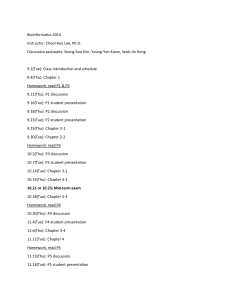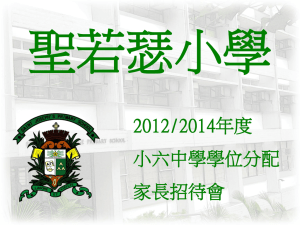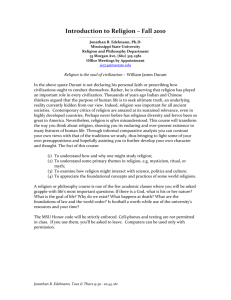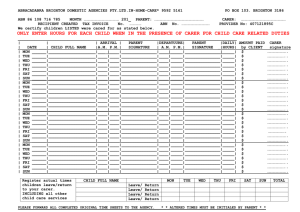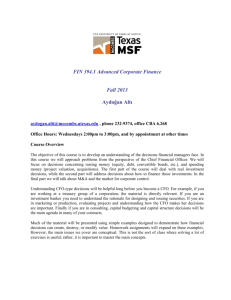english 465 syllabus
advertisement
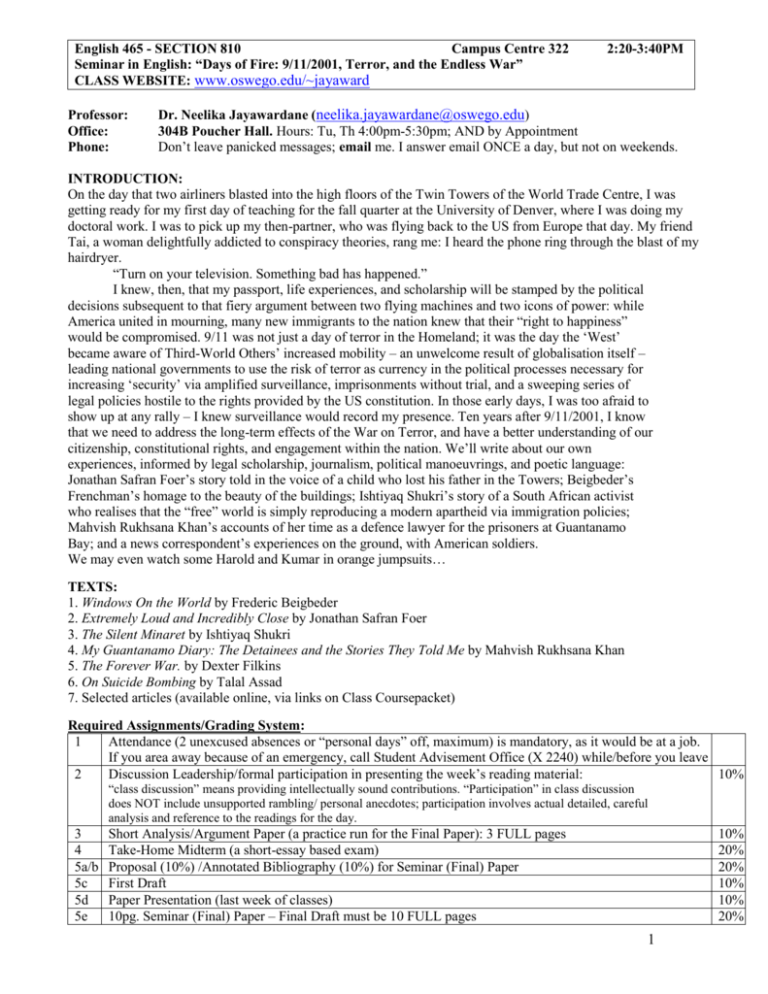
English 465 - SECTION 810 Campus Centre 322 Seminar in English: “Days of Fire: 9/11/2001, Terror, and the Endless War” CLASS WEBSITE: www.oswego.edu/~jayaward Professor: Office: Phone: 2:20-3:40PM Dr. Neelika Jayawardane (neelika.jayawardane@oswego.edu) 304B Poucher Hall. Hours: Tu, Th 4:00pm-5:30pm; AND by Appointment Don’t leave panicked messages; email me. I answer email ONCE a day, but not on weekends. INTRODUCTION: On the day that two airliners blasted into the high floors of the Twin Towers of the World Trade Centre, I was getting ready for my first day of teaching for the fall quarter at the University of Denver, where I was doing my doctoral work. I was to pick up my then-partner, who was flying back to the US from Europe that day. My friend Tai, a woman delightfully addicted to conspiracy theories, rang me: I heard the phone ring through the blast of my hairdryer. “Turn on your television. Something bad has happened.” I knew, then, that my passport, life experiences, and scholarship will be stamped by the political decisions subsequent to that fiery argument between two flying machines and two icons of power: while America united in mourning, many new immigrants to the nation knew that their “right to happiness” would be compromised. 9/11 was not just a day of terror in the Homeland; it was the day the ‘West’ became aware of Third-World Others’ increased mobility – an unwelcome result of globalisation itself – leading national governments to use the risk of terror as currency in the political processes necessary for increasing ‘security’ via amplified surveillance, imprisonments without trial, and a sweeping series of legal policies hostile to the rights provided by the US constitution. In those early days, I was too afraid to show up at any rally – I knew surveillance would record my presence. Ten years after 9/11/2001, I know that we need to address the long-term effects of the War on Terror, and have a better understanding of our citizenship, constitutional rights, and engagement within the nation. We’ll write about our own experiences, informed by legal scholarship, journalism, political manoeuvrings, and poetic language: Jonathan Safran Foer’s story told in the voice of a child who lost his father in the Towers; Beigbeder’s Frenchman’s homage to the beauty of the buildings; Ishtiyaq Shukri’s story of a South African activist who realises that the “free” world is simply reproducing a modern apartheid via immigration policies; Mahvish Rukhsana Khan’s accounts of her time as a defence lawyer for the prisoners at Guantanamo Bay; and a news correspondent’s experiences on the ground, with American soldiers. We may even watch some Harold and Kumar in orange jumpsuits… TEXTS: 1. Windows On the World by Frederic Beigbeder 2. Extremely Loud and Incredibly Close by Jonathan Safran Foer 3. The Silent Minaret by Ishtiyaq Shukri 4. My Guantanamo Diary: The Detainees and the Stories They Told Me by Mahvish Rukhsana Khan 5. The Forever War. by Dexter Filkins 6. On Suicide Bombing by Talal Assad 7. Selected articles (available online, via links on Class Coursepacket) Required Assignments/Grading System: 1 Attendance (2 unexcused absences or “personal days” off, maximum) is mandatory, as it would be at a job. If you area away because of an emergency, call Student Advisement Office (X 2240) while/before you leave 2 Discussion Leadership/formal participation in presenting the week’s reading material: 10% “class discussion” means providing intellectually sound contributions. “Participation” in class discussion does NOT include unsupported rambling/ personal anecdotes; participation involves actual detailed, careful analysis and reference to the readings for the day. 3 4 5a/b 5c 5d 5e Short Analysis/Argument Paper (a practice run for the Final Paper): 3 FULL pages Take-Home Midterm (a short-essay based exam) Proposal (10%) /Annotated Bibliography (10%) for Seminar (Final) Paper First Draft Paper Presentation (last week of classes) 10pg. Seminar (Final) Paper – Final Draft must be 10 FULL pages 10% 20% 20% 10% 10% 20% 1 EXPANATION OF ASSIGNMENTS/GRADING SYSTEM: 1. Attendance/Participation: Emergency Absences: If you are absent FOR MORE THAN 3 DAYS from campus due to a documentable emergency/health issue, contact Student Advisement Office (X 2240) BEFORE or WHILE you are away (they will not work with you AFTER the absence). Your professors will be sent an official letter regarding your absence. This is the proper way for you to deal with a personal emergency in the workplace of the classroom – professors are not trained as therapists, nor are we trained to respond professionally to private issues. Attendance for this class is mandatory. Technically, you are allowed two unexcused absences (two absences constitute a week's worth “personal days” off from work), after which your overall grade plummets by a third of a letter grade for each additional missed class. I am NOT responsible for getting you "caught up" with class work, unless you have a legitimate, documented excuse. In my classes, students participate actively in the teaching/learning process. Poor attendance, and poor participation in class discussion will affect your writing, and can lead to a failing grade. 2. Discussion Leadership: Only ONCE during the semester, on a prearranged week of class (you choose the week), each person will be responsible for being the “Primary Source” of information about the readings. On the day that you sign up to be a Primary Source, you are expected to know the texts thoroughly, and contribute towards the lecture by participating in the “teaching” of the class. Everyone in class is meant to participate weekly, but on this day, you will be the go-to person(s). You are expected to provide insight, bring up relevant historical and political material (from assigned articles, websites, links I provide on the course website), and be responsible for details within the novel/book we are reading. Since more than one person will lead discussion, meeting with each other before class, and meeting with me is very helpful. It will help you clarify difficult theoretical concepts. 3. Short Analysis/Argument Paper (3 FULL pages): in my previous courses, I saw that students often had serious problems with their writing, on the sentence-construction level. They also didn’t know how to formulate a proper “argument” for a paper – which is quite different from conducting a simple “review” or summary/description of a book. So though the ideas may be wonderful in a paper, the writing did not convey that wonder – leading to poor grades. This semester, we will BEGIN the class learning how to construct a proper argument, provide adequate evidence, and quote and cite other experts’ writing as backup for your own ideas. You will also learn early whether you have serious writing problems – in which case, it will be up to you to get help from the Writing Centre, or via a tutor to learn the skills necessary for a 400+ level course. 4. Midterm Essay Exam: The exam in this class is a take-home, and is therefore meant to allow you time to think critically/answer thoughtfully, rather than conduct rushed regurgitation. I strongly encourage you to study together in preparing for your exams; but students who produce suspiciously identical sentences/answers will fail the class. Collaborative learning is a positive thing, but sharing written answers, telling someone what to write, or copying each other’s writing or answers = plagiarism. The writing should take you about 4 hours to complete – if you’ve read carefully, taken the time to review the material and notes before you begin writing (as with any exam). However, if you are not familiar with the material, or have not being paying attention in class, it will take you much longer: all questions on the exam will address discussions that arose within class. Of course, late exams will not be accepted. 5. Seminar Paper, Proposal/Bibliography: The Proposal/Bibliography and Seminar Paper assignments will be explained clearly in class, in handouts, and on the class website. We will discuss options for topics. The final paper is expected to be a theoretically informed, critical essay incorporating our assigned texts; you are expected to demonstrate knowledge of cultural critics and the content of their writing, but in the end, you must advance your own compelling argument and analysis. The drafts/extended time given 2 to prepare this paper is meant to allow you to develop excellent writing/research skills, and get you ready for graduate-level work. POLICIES, EXPECTATIONS, RESPONSIBILITIES (Refer to Student Handbook for details): 1. Late work: LATE PAPERS/EXAMS will absolutely NOT be accepted after the due date. This is a non-negotiable policy, so please do not try to negotiate and/or weep through an excuse. In the “real” workplace, a missed deadline = loss of a project, a lost pay cheque, or a lost job. In cases of dangerous weather/documented emergency: email a copy of essay BY THE DUE DATE (no later than class time). Upon your return, submit an identical, printed copy. 2. Emergency Absences: Illness/family emergencies: again, if you are absent FOR MORE THAN 3 DAYS from campus because of an emergency/health issues that can be documented, contact Student Advisement Office (315-312-2240) BEFORE/WHILE you are away (they will not work with you AFTER the absence). All your professors will be sent an official letter stating that you will be absent for valid reasons – so there is no need to have to spill your guts to each professor. 3. Timeliness/habitual lateness: Lateness is disruptive and disrespectful; I keep a record on the attendance sheet. Arriving late to class, leaving for extensive, self-appointed breaks during class, or having (good/bad) excuses for leaving early will reflect on your attendance/participation grade. 4. Plagiarism, and the Avoidance of . . .Obviously, this is non-negotiable: Anyone who plagiarises (in its many forms) will fail the class. Writers who copy ideas and/or language from another writer (or friend/classmate) without providing appropriate documentation using MLA guidelines (in-text and in Works Cited) are plagiarizing and will fail the class; copying from an Internet source and/or a classmate are likewise forms of plagiarism and will meet with similar failure of the class. Since this is a 400+ level course, I expect that you know how, when, and why to cite and document ALL sources. However we will review the conventions of integrating research into your own writing. See The Registrar’s official policies: http://www.oswego.edu/administration/registrar/policy_text.html#cpii. 5. Students with disabilities: the Office of Disability Services is available to assist students who have a legally documented disability or students who suspect that they may have a disability. If you have a disabling condition that may interfere with your ability to successfully complete this course, please contact the Office of Disability Services. (Alternative testing for students with learning disabilities is available through Disability Services.) 6. A word about responsibilities, having self-respect (rather than self-esteem), and not “giving your power away”: I make the syllabus, assignments, grading system, expectations, policies, and all responsibilities very clear – so that my students and I will maintain the boundaries that will help us cultivate respect for ourselves, and for each other. Often, students will ask me to “solve” a problem that has resulted because of their own irresponsibility, or lack of planning: that is called “giving your power away” – meaning that I now have miraculously been granted the “power” to untangle the consequences of a problem created by someone else. I’m not a fan of censorship or secrecy, and am fully committed to open, productive discussion; I expect students to articulate their concerns about any aspect of this course. A respectful dynamic between professors and students facilitates ‘positive solutions’: a process whereby both parties identify problems, share understanding, examine their unique responsibilities & perspectives, and seek healthy solutions. I, personally, get no power or happiness from being a “Saviour” figure who leaps to the rescue – so please be prepared to offer positive solutions when you state your concern. I encourage you to be your own advocate –to take appropriate responsibility, to honestly self-reflect and to share this dynamic process with me. Become the powerful individual that you are…you’ll see astonishing results! 7. Meeting with the Instructor I do not meet with students immediately BEFORE/AFTER class begins/ends, because the content of such fraught conversations usually distract me from my primary responsibility—teaching a class of twenty people. However, I am available during office hours, and through arranged appointments – I will make extra 3 time for students who are willing to work on their writing. I recommend that students come and discuss the readings and the writing assignments with me because it not only helps you, but also helps me direct the next class discussion. Take advantage of the hours I sit around in my office throughout the semester. 7. WRITING FUNDAMENTALS This is a 400+ level course, so I expect that you have mastered basic writing skills. If I can’t read your sentences, I will not know the brilliant idea that you are trying to communicate. I will NOT be teaching basic, standard English; while I can help you organise the presentation of an argument in a paper, a 400+ level course is not the place to learn fundamental sentence structure. In any writing project submitted for this course, you will lose a letter grade for patterns of one of the following errors: comma splices, runons, fragments, passive voice. See a tutor in the Writing Centre regularly if you either do not recognise how to identify and correct each of these or if you know you have a pattern of such errors that you have failed to correct in your tenure at the university. Schedule of Readings WEEK 1 January Tues, 25th: Class Introductions (Fill out personal index cards) Overview of Syllabus: texts, assignments, policies, grading system Course packet articles, discussion questions, links on website FOR THURSDAY: Go to class website - click on ENG 465 COURSEPACKET link Prepare to answer (in class) Study Questions (WEEKS 1&2) WEEK 2 February Thur, 27th: Windows on the World, Frédéric Beigbeder: opening pages-51 COURSEPACKET: intro material for the author, novel Tue 1st : BEGIN: Talal Assad, On Suicide Bombing, 1-38 (Intro, Ch.1) Beigbeder contd. pp. 55-73; 81-89; 94-97 Thu 3rd: Beigbeder contd. pp. 105-126; 164-171 * DISCUSSION: Short Analysis/Argument Paper (3 FULL pages)* (Begin: Jonathan Safran Foer’s Extremely Loud over weekend) * LAST DAY TO ADD A SEMESTER COURSE WITHOUT PENALTY: WEDNESDAY, FEBRUARY 2, 2011* WEEK 3 February Tue 8th: Beigbeder contd. pp. 186-202; 209-234 Begin Safran Foer’s Extremely Loud, opening pages-34. COURSEPACKET: intro material for the author, novel Thu 10th : FINISH Beigbeder, p. 243; 257-269; CONTINUE Foer’s Extremely Loud, 35-85 COURSEPACKET: see websites/articles for discussion * DISCUSSION: Analysis/Argument Paper: how to formulate an intro, support Ps, cite * WEEK 4 February WEEK 5 February WEEK 6 March * LAST DAY TO DROP A SEMESTER COURSE WITHOUT PENALTY: FRIDAY, FEBRUARY 11, 2010 * Tue 15th: * DUE: 3-page Analysis/Argument paper (3 FULL pages) * Beigbeder contd. p. 289; 297-303 (end); Foer’s Extremely Loud, opening 86-141 Thu 17th: Continue: Foer’s Extremely Loud, 142-207 COURSEPACKET: see websites/articles for discussion nd Tue 22 : Continue Foer’s Extremely Loud, 208-284 COURSEPACKET: see websites/articles for discussion Thu 24th: Continue Foer’s Extremely Loud, 285-end COURSEPACKET: see websites/articles for discussion Tue 1st: Begin Dexter Filkins, The Forever War, opening pages-37 & Mahvish R. Khan, My Guantanamo Diary, opening (including “Author’s Note”- p.30) COURSEPACKET: intro material for the authors, books Thu 3rd: Continue Filkins, The Forever War, 38-67 Khan, My Guantanamo Diary, 31-82 4 WEEK 7 March Tue 8th: Continue Filkins, The Forever War, 69-133 Khan, My Guantanamo Diary, 83-132 Thu 10th: Continue Filkins, The Forever War, 134-167 Khan, My Guantanamo Diary, 133-177 * ASSIGNED MIDTERM EXAM * WEEK 8 March MARCH 12th – 20th: SPRING BREAK WEEK 9 March Tue 22nd: Film: GITMO: The New Rules of War Coursepacket: Jayawardane, on Gandini and Salih’s film, GITMO: The New Rules of War WEEK 10 March Thu 24th : Return to Talal Assad, On Suicide Bombing, 39-92 (Chapters 2, 3) Continue Filkins, The Forever War, 168-213 Tue 29th: Finish Filkins, The Forever War, 214-217; 315-342 And complete Khan, My Guantanamo Diary, 179-197; 229-235; 251-298 WEEK 11 April Thu 31st: *MIDTERM EXAM DUE IN CLASS* Film: The Road to Guantanamo Tue 5th : BEGIN Begin Ishtiyaq Shukri, The Silent Minaret (Opening - p.46) COURSEPACKET: intro material for the author, novel * DISCUSSION: PROPOSAL/ANNOTATED BIB/ FINAL (10-page) PAPER * WEEK 12 April WEEK 13 April WEEK 14 April WEEK 15 May WEEK 16 May Thu 7th : Continue Shukri, The Silent Minaret, pp. 47-104 COURSEPACKET: see class website Tue 12th : Continue Shukri, The Silent Minaret, pp. 105-176 COURSEPACKET: see websites/articles for discussion DISCUSSION: Proposal/Annotated Bibliography * QUEST DAY (WEDNESDAY, 13TH APRIL) * th Thu 14 : END Shukri, The Silent Minaret, pp. 176-242 (END) COURSEPACKET: see websites/articles for discussion Tues 19th: * DUE: PROPOSAL/ANNOTATED BIBLIOGRAPHY * FILM: Still to be decided…. Thursday 21st: Free Day Tue 26th : In-class meetings (mandatory): discuss papers, arguments, research strategies, organisation *Sign up for conferences (Thursday) Thu 28th: * DUE: DRAFT OF SEMINAR PAPER (3 Pages) in class * CONFERENCES (by appointment) Tue 3rd: Symposium presenting research papers Thu 5th : Symposium presenting research papers * FINAL PAPER DUE, FRIDAY 6th MAY* Your Horrible Finals Week – Happily, there’s no final in this class. Just the gigantic paper. 5

